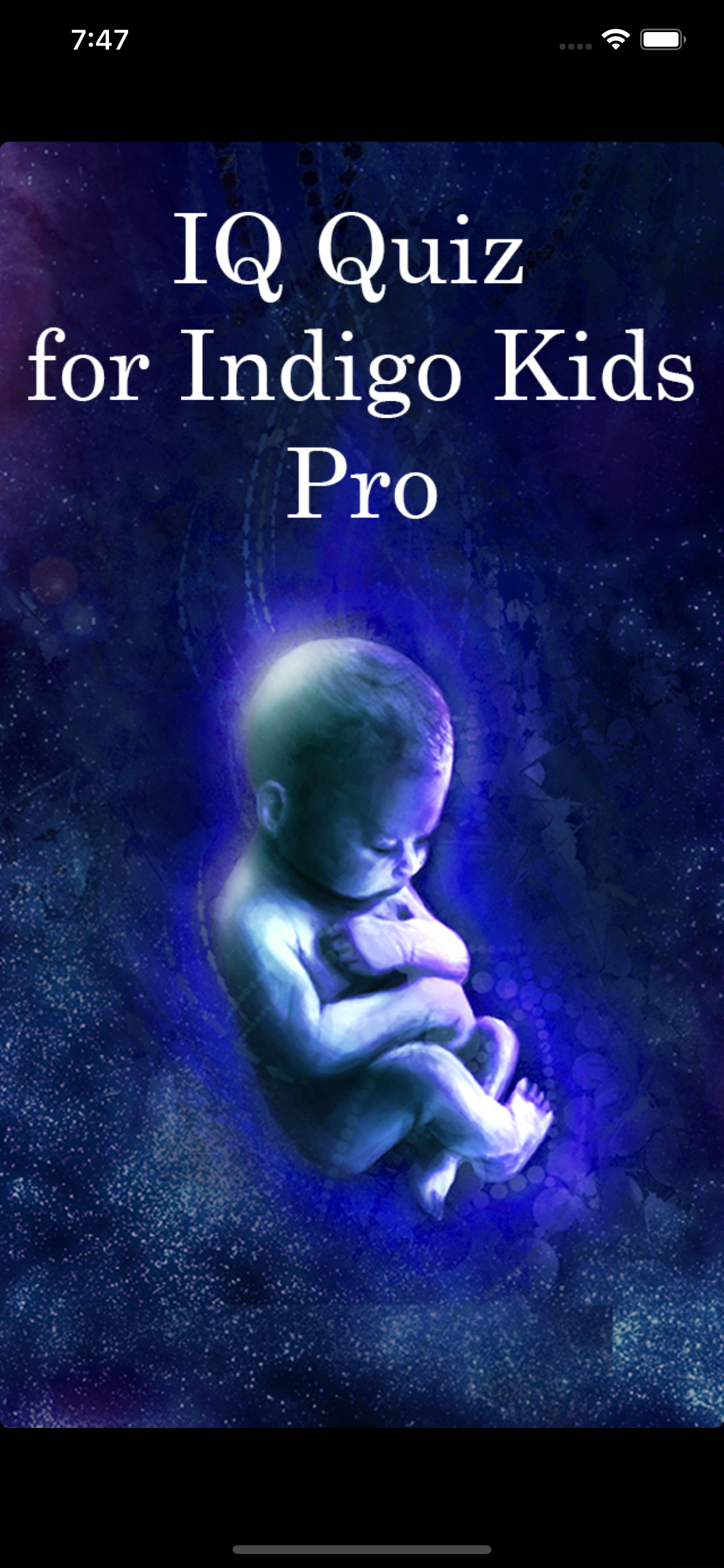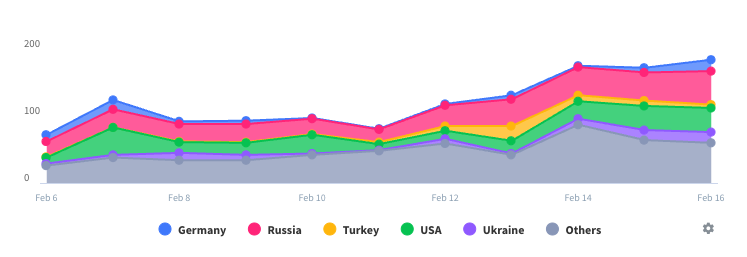
Description
Our innovative test - exclusive «Indigo IQ Free» - is a reasoning test for REAL indigo kids. If you have children, now you can test their reasoning abilities. Learn their REAL aptness!
Indigo children is a label given to children who are claimed to possess special, unusual and/or supernatural traits or abilities. The idea is based on New Age concepts developed in the 1970s by Nancy Ann Tappe. The concept of indigo children gained popular interest with the publication of a series of books in the late 1990s and the release of several films in the following decade. A variety of books, conferences and related materials have been created surrounding belief in the idea of indigo children and their nature and abilities. These beliefs range from their being the next stage in human evolution or possessing paranormal abilities such as telepathy to the belief that they are simply more empathic and creative than their peers.
The term "indigo children" originates with parapsychologist and self-described synesthete and psychic, Nancy Ann Tappe who developed the concept in the 1970s. Tappe published the book Understanding Your Life Through Color in 1982 describing the concept, stating that during the mid 1960s she began noticing that many children were being born with "indigo" auras (in other publications Tappe has said the color indigo came from the "life colors" of the children which she acquired through her synesthesia). The idea was later popularized by the 1998 book The Indigo Children: The New Kids Have Arrived, written by husband and wife self-help lecturers Lee Carroll and Jan Tober. The promotion of the concept by Tober and Carroll brought greater publicity to the topic, soon their book became the primary source on "indigo children".
This test consists of 30 items. Every item includes a statement and three corollaries – logical sequents of the statement. Only one corollary out of three is correct. Your task is to select correct logical sequents.
This test contains made-up funny-looking words, which don't exist in language. These words are intended to estimate your ability to ratiocinate, separating reasoning from your other knowledge of the outward. These words are deemed to mean anything so that the initial statements in the test make sense.
~~~~~~~~~~~~~~~~~~~~~~~~~~~~~
TEST RESULT:
~~~~~~~~~~~~~~~~~~~~~~~~~~~~~
Free version - After completing the test you will see your score on a 1-30 scale. One correct answer stands for 1 point.
Pro version - You will see not only the total number of questions you answered correctly, but also what answer is correct and what isn't.
~~~~~~~~~~~~~~~~~~~~~~~~~~~~~
LANGUAGES
~~~~~~~~~~~~~~~~~~~~~~~~~~~~~
English, French, German, Italian, Spanish, Russian, Ukrainian
Hide
Show More...
Indigo children is a label given to children who are claimed to possess special, unusual and/or supernatural traits or abilities. The idea is based on New Age concepts developed in the 1970s by Nancy Ann Tappe. The concept of indigo children gained popular interest with the publication of a series of books in the late 1990s and the release of several films in the following decade. A variety of books, conferences and related materials have been created surrounding belief in the idea of indigo children and their nature and abilities. These beliefs range from their being the next stage in human evolution or possessing paranormal abilities such as telepathy to the belief that they are simply more empathic and creative than their peers.
The term "indigo children" originates with parapsychologist and self-described synesthete and psychic, Nancy Ann Tappe who developed the concept in the 1970s. Tappe published the book Understanding Your Life Through Color in 1982 describing the concept, stating that during the mid 1960s she began noticing that many children were being born with "indigo" auras (in other publications Tappe has said the color indigo came from the "life colors" of the children which she acquired through her synesthesia). The idea was later popularized by the 1998 book The Indigo Children: The New Kids Have Arrived, written by husband and wife self-help lecturers Lee Carroll and Jan Tober. The promotion of the concept by Tober and Carroll brought greater publicity to the topic, soon their book became the primary source on "indigo children".
This test consists of 30 items. Every item includes a statement and three corollaries – logical sequents of the statement. Only one corollary out of three is correct. Your task is to select correct logical sequents.
This test contains made-up funny-looking words, which don't exist in language. These words are intended to estimate your ability to ratiocinate, separating reasoning from your other knowledge of the outward. These words are deemed to mean anything so that the initial statements in the test make sense.
~~~~~~~~~~~~~~~~~~~~~~~~~~~~~
TEST RESULT:
~~~~~~~~~~~~~~~~~~~~~~~~~~~~~
Free version - After completing the test you will see your score on a 1-30 scale. One correct answer stands for 1 point.
Pro version - You will see not only the total number of questions you answered correctly, but also what answer is correct and what isn't.
~~~~~~~~~~~~~~~~~~~~~~~~~~~~~
LANGUAGES
~~~~~~~~~~~~~~~~~~~~~~~~~~~~~
English, French, German, Italian, Spanish, Russian, Ukrainian
Screenshots
Indigo Kids FAQ
-
Is Indigo Kids free?
Yes, Indigo Kids is completely free and it doesn't have any in-app purchases or subscriptions.
-
Is Indigo Kids legit?
Not enough reviews to make a reliable assessment. The app needs more user feedback.
Thanks for the vote -
How much does Indigo Kids cost?
Indigo Kids is free.
-
What is Indigo Kids revenue?
To get estimated revenue of Indigo Kids app and other AppStore insights you can sign up to AppTail Mobile Analytics Platform.

User Rating
1 out of 5
1 ratings in Chile

Ratings History
Indigo Kids Reviews
Store Rankings

Ranking History
App Ranking History not available yet

Category Rankings
App is not ranked yet
Indigo Kids Installs
Last 30 daysIndigo Kids Revenue
Last 30 daysIndigo Kids Revenue and Downloads
Gain valuable insights into Indigo Kids performance with our analytics.
Sign up now to access downloads, revenue, and more.
Sign up now to access downloads, revenue, and more.
App Info
- Category
- Education
- Publisher
- Dzianis Azarenka
- Languages
- English, French, German, Italian, Russian, Spanish, Ukrainian
- Recent release
- 9.0 (5 years ago )
- Released on
- Apr 8, 2011 (13 years ago )
- Also available in
- United Kingdom, Australia, United States, Russia, Belarus, China, Spain, India, Ukraine, Canada, France, Germany, Chile, Portugal, Saudi Arabia, Italy, Türkiye, Ireland, Philippines, Austria, Indonesia, Peru, Norway, New Zealand, Sri Lanka, Nigeria, Malaysia, Mexico, South Africa, Pakistan, Poland, Romania, Sweden, Singapore, Slovenia, Thailand, Taiwan, Vietnam, United Arab Emirates, Ecuador, Argentina, Azerbaijan, Belgium, Bulgaria, Brazil, Switzerland, Colombia, Czechia, Denmark, Dominican Republic, Algeria, Lebanon, Egypt, Finland, Greece, Hong Kong SAR China, Hungary, Israel, Iceland, Japan, South Korea, Kuwait, Kazakhstan
- Last Updated
- 2 weeks ago
This page includes copyrighted content from third parties, shared solely for commentary and research in accordance with fair use under applicable copyright laws. All trademarks, including product, service, and company names or logos, remain the property of their respective owners. Their use here falls under nominative fair use as outlined by trademark laws and does not suggest any affiliation with or endorsement by the trademark holders.





